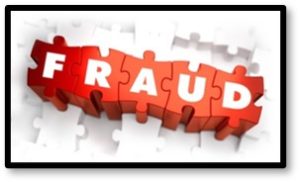Monday Author: Susanne Skinner
Fraud is, at its core, a mathematical equation. More people pitching the scam increases the likelihood of success. Like a legitimate business, scammers create professional organizations. Departments like telesales, list brokers, technology, money laundering and marketing mirror divisions in a genuine company.
 Like the real world, outsourcing fraud to foreign countries is, in itself, a business. Cheap labor and low overhead are easy to find. So is training. The dark web offers courses in identity theft and scams for social security, Medicare and the IRS.
Like the real world, outsourcing fraud to foreign countries is, in itself, a business. Cheap labor and low overhead are easy to find. So is training. The dark web offers courses in identity theft and scams for social security, Medicare and the IRS.
Deception is a low-risk business. The organizers are hard to find and harder to stop. Losses average 170 billion dollars a year in the United States.
Fraud is a nameless and faceless network of crime. It’s the new global industry.
Every Industry, Every Country
Technology makes it easy for fraud to be successful. The evolution of technical expertise goes hand in hand with the evolution of fraud. It is increasingly more sophisticated and less costly, making it easier for criminals to manipulate.
Off shore hubs for scammers include India, Eastern Europe, Nigeria and Jamaica. Call centers for legitimate businesses often base their operations in these countries. Workers speak fluent English, are experienced telemarketers and know their way around a script. Legitimate workers often moonlight as scammers.
Money is a big lure for tech support scammers in third world countries. They see it as a means to rise out of poverty. AARP’s Julie Getz tells the story of Jamaican school children asked what they wanted to be when they grow up. The number one answer is track star Usain Bolt. The number two answer is a scammer.
Not to be outdone, my new home state of Florida is a hot zone for Medicare fraud. Scammers target the elderly, encouraging unnecessary medical tests. Medicare pays the labs; the labs pay kickbacks to the scammers and newly acquired Medicare numbers are up for sale.
Buyer Beware
 Easy money is one of the simplest and easiest scams to pull off. The way to avoid it is also simple: do not agree to any proposition involving money from a person or an organization you do not know. It is an old adage but it bears repeating—if it sounds too good to be true it probably is. Promised riches rarely deliver, instead relieving the “investor” of personal cash and savings.
Easy money is one of the simplest and easiest scams to pull off. The way to avoid it is also simple: do not agree to any proposition involving money from a person or an organization you do not know. It is an old adage but it bears repeating—if it sounds too good to be true it probably is. Promised riches rarely deliver, instead relieving the “investor” of personal cash and savings.
By responding to non-existent sweepstakes, lotteries, and special one-time offers, victims give away personal information sold to scammers across the globe. Social media is the mother lode of information for data miners.
Answering quizzes and playing online games reveals information for internet criminals to build a detailed personal profile they can sell. A common social media post often begins with the words, “I’ve been hacked.”
Private information is available in part because it’s easy and costs nothing to purchase and in part because we give it away. Data, and data mining, is a big moneymaker for those with bad intentions.
Third-Party Fraud
 Third-party fraud, also called identity fraud, is when someone submits credit applications with a fabricated or stolen identity. New account fraud is the most expensive type of identity theft for U.S. banks.
Third-party fraud, also called identity fraud, is when someone submits credit applications with a fabricated or stolen identity. New account fraud is the most expensive type of identity theft for U.S. banks.
Identity thieves obtain consumer information using a wide range of techniques. Common methods include sifting through trash for bank and credit card statements and hacking corporate databases and mobile phones. Using this information, they can manipulate an existing account or create a new one.
Fabricated information is easy to create. Website tutorials are available to help scammers create false pay stubs and computer programs make it easy to hack and modify existing files.
Synthetic identity fraud combines fake and real consumer information to create a new identity. Falsified accounts make up 85 percent of all identity fraud in the United States.
Safeguard your personal information and shred sensitive documents. Change your computer passwords often, and maintain virus protection. Never give account numbers over the phone. If someone claims they are calling from your bank, credit card company, or the IRS, ask for a call-back number, then check to make sure it’s legit.
Monitor your accounts and your credit report.
The Top Ten Faces of Fraud
Consumers have multiple channels and methods for accessing money and the internet connects everyone. Never put personal information, especially your birth date, on a computer home page, personal computer profile, or social media sites.
 Fraud wears many faces, and all of us do business with legitimate versions of these services.
Fraud wears many faces, and all of us do business with legitimate versions of these services.
- Wire Fraud
- Online Fraud
- Identity Fraud
- Auto Lending Fraud
- Mortgage Fraud
- Check Fraud
- Synthetic Identity Fraud
- Account Takeover Fraud
- New Account Fraud
- Person-to-Person Fraud
Person-to-Person Payments (P2P) is the hot new trend in banking. Apps like Venmo and Zelle allow users to send money using the recipient’s name, email address, mobile number or checking/savings account information.It’s also the hottest fraud trend. Cybercriminals and scammers love these instant payment options.
No One is Safe
Successful scams use two assumptions. The first is a scammer who believes they are smarter than the person they scam. The second is a gullible victim. Getting scammed implies we are not as savvy as we think we are. The truth is everyone is gullible and anyone can be a victim.
Predators invest time and effort in a scam and most of us don’t realize it’s happened until it’s too late. It’s not about who’s smart and who’s not. It’s about whom to trust. Fraudulent companies and scammers thrive on convincing people they are trustworthy.
Fraud touches every area of our life. Fraud organizations are sophisticated and difficult to stop. Fight back by staying informed and protecting your personal information. The best offense is still a good defense when it comes to protecting your identity and investments.
